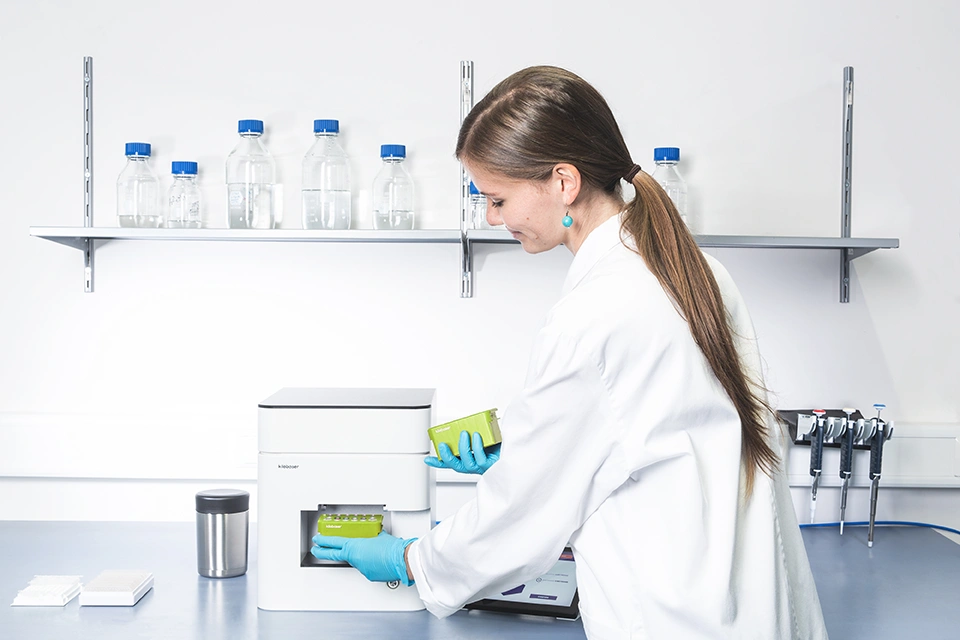
DNA Probes
in a nutshell
In simple terms, DNA probes are specifically chosen, short nucleotide sequences with a reporting modification on at least one end. For the majority of applications, DNA probes are dual labeled with reporter and quencher modification.
The 3 building blocks
Single Stranded DNA; 15-35 bp long; specific to target DNA
Reporter dye; emitting a certain wavelength
Quencher; absorbing the emitted wavelength
The probe principle

Like a bad neighbor, the quencher absorbs all signal emitted by the reporter. For this to happen, reporter and quencher have to be very close to each other.
Once reporter and quencher move apart, the signal is no longer absorbed and can be detected.
Therefore, the connecting DNA strand must be constructed in such a way that the distance between reporter and quencher can change during a reaction.
The variety of designs results in the different types and applications of DNA probes.
Probe Application

DNA probes, for example FISH probes, TaqMan and Molecular Beacon probes, are mostly used for quantification and detection applications.
Possible Methods & Applications:
RT-qPCR
Real-Time/qPCR
Multiplex PCR
Pathogen detection
Gene detection
Gene mutation detection
Gene localisation
Dual labeled probe synthesis

First, it is important to understand that a DNA strand has two ends, which differ in their biochemical properties. These are called the 3′-end and the 5′-end.

Thanks to Controlled Pore Glass (CPG), we can anchor molecules of our choice directly to the solid phase, i.e. the column. As a result, each DNA synthesis begins with a modification of one‘ s choice.

Since DNA synthesis runs from 3′-end to 5′-end, the solid phase anchored modification, the quencher, is located on the 3′-end of the DNA probe. The DNA probe grows with each nucleotide base added to the DNA strand.

Once the sequence is fully synthesized, it is time to bind the second modification, the reporter, at the 5′-end.

Finally, the basic structure of the DNA probe is completed. Just a few more chemical steps and we get a ready-to-use DNA probe!
In order to get more in-depth understanding, you can find more on our blog about fluorescent probes and PCR.
DNA probe synthesis with Kilobaser
ready-to-use DNA probes in 3 steps
enter sequence
insert chip & cartridge
press start
Discover more about how Kilobaser helps smoothen your lab routine!
FAQ – DNA Probes
With our 6-FAM reagent cartridge you are able to synthesize DNA probes automatically labeled on 5'-end with 6-FAM Reporter. You will not need any extra reagents.
Use our BHQ-1 Microfluidic chip to synthesize DNA probes labeled on 3'-end with BHQ-1 Quencher. You do not need to add extra reagents, since BHQ-1 is already anchored to the column in the chip.
Yes, you absolutely can with the Kilobaser DNA & RNA Synthesizer Extended Edition! As reagent cartridge, use the 6-FAM cartridge and combine it with the BHQ-1 microfluidic chip. As a result, your DNA probe will be labeled with a 6-FAM reporter at 5'-end and with a BHQ-1 quencher on 3'-end.
Yes, the Kilobaser one-XT can! Use the 6-FAM reagent cartridge in combination with the BHQ-1 microfluidic chip. With this combination, your DNA probe will be labeled with a 6-FAM reporter at 5'-end and with a BHQ-1 quencher on 3'-end.
For 5'-end labeled 6-FAM FISH probes with synthesis with Kilobaser DNA & RNA Synthesizer Extended Edition you combine our FISH chip with the 6-FAM reagent cartridge.

You have further questions? Find the answer in our FAQ-Section.
Or send us a message:
We are happy to introduce you to the world of Kilobaser



